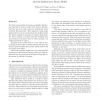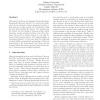42 search results - page 3 / 9 » A Generational Mostly-Concurrent Garbage Collector |
PLDI
2005
ACM
14 years 1 months ago
2005
ACM
Garbage collection offers numerous software engineering advantages, but interacts poorly with virtual memory managers. Existing garbage collectors require far more pages than the ...
PLDI
1997
ACM
13 years 11 months ago
1997
ACM
If a fixed exponentially decreasing probability distribution function is used to model every object’s lifetime, then the age of an object gives no information about its future ...
OOPSLA
1992
Springer
13 years 11 months ago
1992
Springer
Generational garbage collectors are able to achieve very small pause times by concentrating on the youngest (most recently allocated) objects when collecting, since objects have b...
ECOOP
2007
Springer
14 years 1 months ago
2007
Springer
Abstract. While real-time garbage collection is now available in production virtual machines, the lack of generational capability means applications with high allocation rates are ...
PLDI
1993
ACM
13 years 11 months ago
1993
ACM
This paper describes a new language feature that allows dynamically allocated objects to be saved from deallocation by an automatic storage management system so that clean-up or o...


